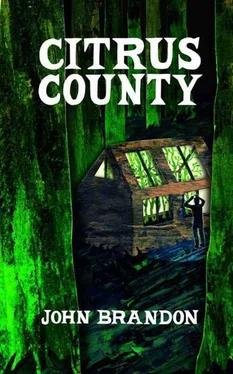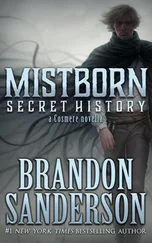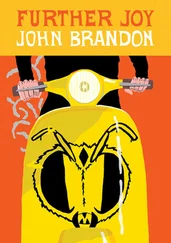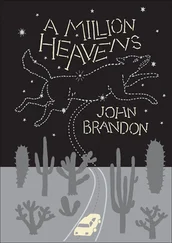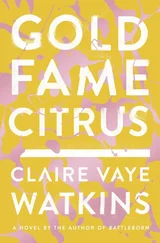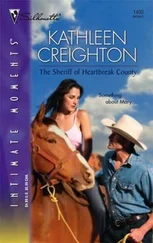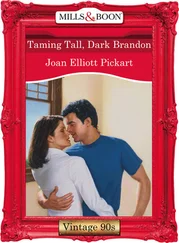He would go to the FedEx in Clermont this afternoon — no messing around with the post office — and tell them to deliver the letter on the morning of the 29th. He didn’t want Dale to have time to think anything over. If she did come, he wanted her rushing to get to him, wanted her to arrive bedraggled, beginning to lose her doubt in Mr. Hibma — her doubt, all she had. He wanted to see her screech into the Publix parking lot in her rental car, panicked, hoping she wasn’t late, hoping Mr. Hibma was bluffing, hoping not to have to talk him out of anything. And what would Mr. Hibma do? He couldn’t meet her there. He’d wander the parking lot and watch for her, and he’d know her when he saw her, and he’d pass close enough to smell the airplane and the foreign air on her, and he wouldn’t say a word. Afterward, if she wanted to reveal what had passed between them, wanted to turn Mr. Hibma in, so be it. That would be her business.
Mr. Hibma was bursting with a foreign feeling. Or perhaps the absence of a familiar feeling. He didn’t feel defensive. He did not feel put-upon, attacked. He was on the move. No other way to move forward had presented itself, and he wasn’t running from the way he had.
Shelby decided to follow Toby on Friday afternoon. A week left in the school year. She couldn’t think of a thing to hope for, and that was good. What she was going to do was hunker down in Citrus County. If she had to be here, she was going to be here. Her passport had arrived in the mail and she had promptly carried it out to the backyard and burned it in a coffee can, the white smoke trailing with the breeze into the treetops. Shelby hadn’t had to coax the fire. The passport went up like kindling, like it knew it was meant to be burned. Shelby had also removed the photograph of Aunt Dale from the hallway. It wasn’t hers to burn, but she’d stashed it out in the utility room. She wasn’t about to pass by the lady every time she went to the bathroom. Her father would ask where the picture went, and Shelby would have to come up with something.
Shelby knew the general direction through the woods Toby started in on the way to his house, but she didn’t want to miss him somehow, didn’t want him to evade her by taking an alternate route, so she blended into a crowd at the end of the science wing and tracked Toby straight from his marine biology class. He nudged past a gaggle of short blondes, crammed his whole bag in his locker, then proceeded at a mourner’s pace out the lunchroom exit. He didn’t stop to talk to anybody. He broke from the parking lot into the woods at a spot that didn’t seem to have a trail. Shelby followed. There was a trail all right, winding and shadowy. Shelby felt exposed in the woods. She wasn’t sure how far behind to stay. Toby kept his eyes on the forest ground, never turning around to check what was behind him. He’d worn a bright red T-shirt that day, so whenever Shelby let him get a few steps too far ahead, she had only to rush forward until the shirt called out through the underbrush. Shelby fell into a rhythm. She kept at least one tree directly between her and Toby. The multitude of bugs in the woods were providing their standard crackling hum, drowning out any noise Shelby made by snapping twigs. She felt dishonest but full of purpose.
They came to an open area, what would have been a meadow if there were such a thing as a meadow in Citrus County, and Shelby let Toby get ahead. She watched him drag through the sandy clearing and into the woods on the other side. Shelby wasn’t a spy, she was a girl in love. There was something delicious about watching Toby with him not knowing she was there. She could see a lot of the tired sky, could see the spot where the sun, in a few hours, intended to set.
She came out into the brightness and hurried across, peering ahead for the red T-shirt, and in a moment there it was, bobbing in the foliage. Toby had sped up. They pushed past bunches of cross-trails, tracks in them from dirt bikes and dogs and raccoons, and they shuffled past countless rabbit holes, countless isolated bogs that hid countless snakes. They passed a shopping cart full of beer cans. They’d been walking for close to an hour. Sweat was dripping off Shelby’s nose. She could taste it. The sun was a bald eye. It was clearing away the clouds, making preparations.
The best odds were on Uncle Neal being exactly how Toby had described him, bewildered but volatile. Probably the house would look normal, and Toby would take a shower and play solitaire or something, and Uncle Neal would be down for his pre-dinner nap. Probably Shelby would find nothing damning about the household, but she had to check. She had to see where Toby lived. She was doing this partly for herself, she knew, following Toby for her own reasons. At night, when he was at his house and she at hers, she would be able to picture Toby safe in his bed. She would be able to see him drift off to sleep as she drifted off to sleep. He was her only friend, and at night she knew that more than ever.
Shelby sensed something above her and took a bad step. It was an owl. The thing was ten feet over her head. The owl didn’t like having people in its woods; that was clear from the look on its face. Shelby whispered hello to the owl and it did not blink. It was a haughty little statue. Shelby wanted to throw something at it, but she was afraid. It was like the snake on her patio. It wasn’t going to move until Shelby went away. She had to keep going. She got back on Toby’s trail, and soon saw power lines. The woods grew less wild. Toby’s red shirt bumped up onto a porch. Shelby had made it. The house was in view. Toby dug out his key, wiggled it into the lock, and went inside.
Shelby pulled her shoulders back. She took stock, drifting around the side of the property. No flowerbeds, not even grass to speak of. No sports equipment or bikes lying around. No dog, no cat. The house was the color of an old gym bag. It had a wide front porch with a rocking chair. The place appeared tidy in its spareness, except for the gnarly live oak branches hanging near the roof, some of them scraping when the breeze picked up. There were no squirrels, no vultures soaring high above. The blinds in most of the windows were open but Shelby could not see in. She was too far away and the house was dim inside.
She made her approach near a shed that looked at once dilapidated and sturdy, some kind of greenhouse. It smelled cramped, like things overgrown. In the woods, Shelby’s footfalls had been drowned out, but now she could hear the soggy ground compressing under her boots. She could hear the wind brushing the back of her neck. There was one window on this side of the house, all the way at the back, looking like a mistake. It looked like the windows they put in the walls of fortresses, to see the enemy coming. Shelby slipped across the yard and rested against the worn stucco. Her heart was beating so quickly it seemed to have stopped.
She shuffled down the wall. The blinds of the little window were open. She inched her face, seeing more and more of the room inside. She placed her forehead against the cool glass. She was looking at Toby’s bedroom. This was it. There was his dirty laundry in a basket, the shirt he’d worn to school yesterday, his track shorts. The bedroom door was closed and Shelby knew that at any moment it might fly open. There was a big closet in Toby’s bedroom, the doors not fully closed. Dog-eared cardboard boxes. A stack of folded sweatshirts he’d retired for the summer. There was no TV in the room, no radio. Toby had hung no posters, had no bookshelf. He didn’t read comics or play video games. There was a case of soda on the floor near the bed. The cords for the fan and the light hung low, so he could reach them while lying down. The carpet was a couple shades of marbled brown. Shelby locked the image of his room into her mind, the garish hue of his bedsheet, the water stain on the ceiling, the riveting stillness. She felt satisfied, like now she would be playing with house money. There were shreds of peace within her, blowing around like confetti. Shelby didn’t need Aunt Dale. She didn’t need to go to Iceland. It didn’t matter where you went. Where meant nothing. Maybe, Shelby thought, she’d always been playing with house money. Maybe everyone was, every day they were alive.
Читать дальше
